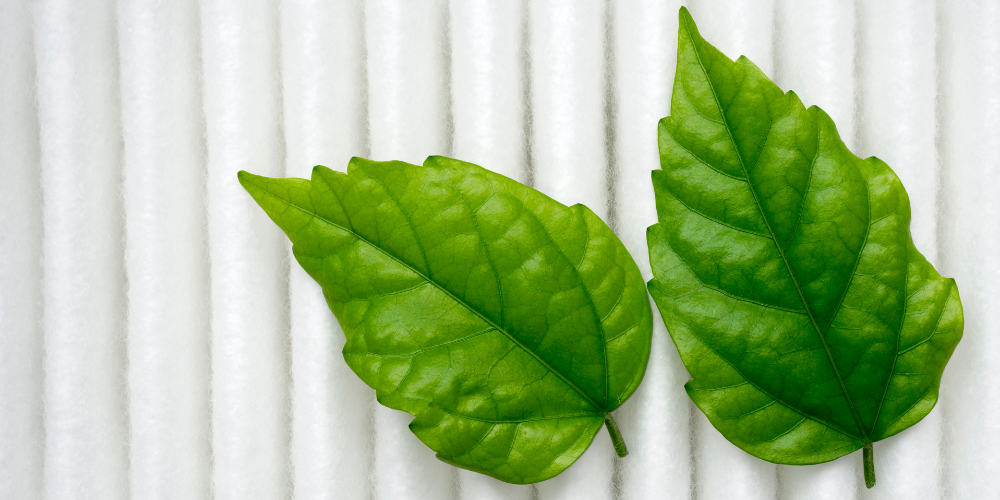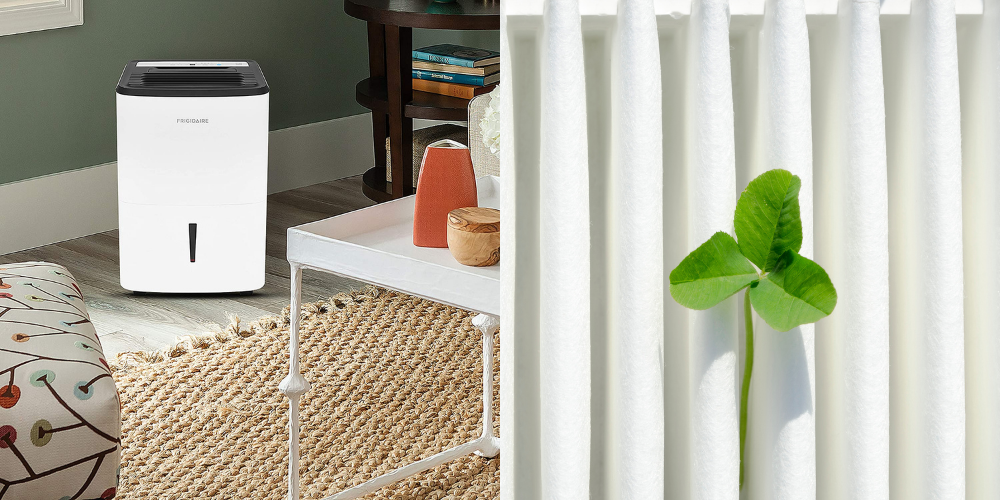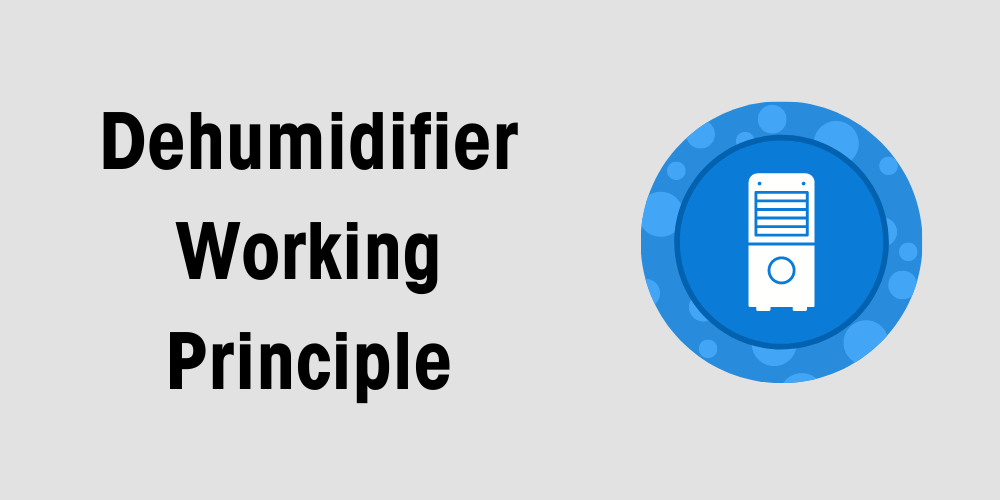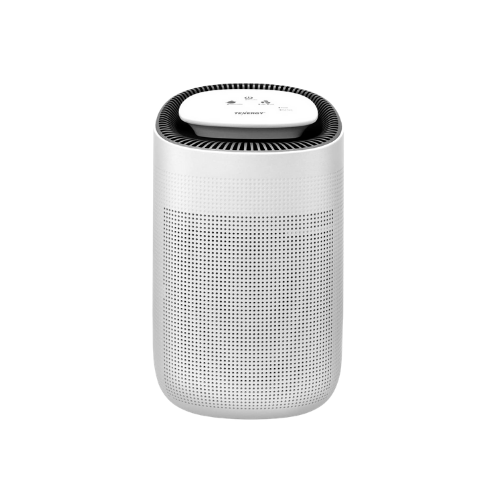Does dehumidifier purify air?
3 Key Takeaways:
🚀 Dehumidifiers do not purify the air on their own. They require air purifiers or some air filtering or ventilating products to cleanse the home environment.
🚀 Only a dehumidifier and air purifier combo can purify the air efficiently while at the same time tackling indoor humidity.
🚀 Maintaining excellent indoor air quality must be a priority in every home. Air purification is possible by investing in the right air purifiers and dehumidifiers.
Maintaining excellent indoor air quality must be a priority in every home. Unfortunately, not all homes are naturally blessed with indoor air that’s free from dust mites, mold spores, and other pollutant particles and dust particles. Musty smell and excess moisture levels are the most common allergy-triggering side effects of humid environments.
Air purification is possible by investing in the right air purifiers and dehumidifiers. Apart from removing excess moisture levels and maintaining the ideal humidity levels for your home, dehumidifier and air purifiers also aid in preventing mold spores, reducing asthma attacks, and making humid areas comfortable for allergy sufferers.
Let us take a look at home air purifiers and dehumidifiers that are readily available to help you with air purification and give you cleaner air.
What does it mean to purify the air?

Air purification is simply removing air pollutants and air pollution. There are tons of many pollutants, different kinds of them that pollute the air and reduce the indoor air quality. That’s why we have several kinds of air filters and dehumidifiers that help to make purifying air easier. How air purifiers work and if both an air purifier and dehumidifier have to be present in a home to keep air pollutants away or if just air purifiers would suffice, etc., are the various discussions we will have further.
Everyone deserves to breathe in the fresh air and cleaner air. However, even in the well-kept room’s humidity levels might be creating a humid environment that adds to high humidity levels. High moisture levels in any space will come with their own allied problems, just like drier air has its own.
One must remember that both moist air and dry air inside a home will contribute to respiratory system damage and respiratory problems. Allergy sufferers, those with seasonal allergies, and especially those prone to asthma attacks may suffer more from poor indoor air quality than outdoor pollution.
When it comes to understanding which is better between an air purifier vs dehumidifier, air purifiers and dehumidifiers have their own share of benefits and disadvantages. Based on the requirements of the indoor space to maintain air quality, you can choose the unit that is essential. Here are a few of the many steps to be followed while purifying the air.
Removing excess moisture is important to keep away moist air which can be breeding grounds for mold spores and mold growth. High relative humidity levels will make it difficult to maintain light, moist free, fresh air. The surrounding air that is laden with excess moisture must be dealt with at the earliest.
Air purifier filters, UV light, etc., may not be fully sufficient to remove excess moisture and excess humidity level, be it from a wet basement or a living room, as efficiently as a dehumidifier. Remove moisture and get rid of the humid climate to keep dirty air and moisture-laden air away. This is also the best resort to remove mold spores and prevent mold growth at all times.
A room’s humidity levels will also make it difficult to remove other dust mites, and dust particles like pet dander. Apart from removing mold spores and dust mites, an air purifier works to enhance the indoor air quality, keeping it free from all air pollutants. Hepa filter, UV light air filters, etc., are some modifications that come in air conditioners and air purifiers. With the latest technology, even air conditioning can be achieved with clean air to a certain extent. Your air conditioner can ensure the indoor air is clean and filter the air that you breathe in to a good extent.
Air filters in air purifiers will make sure that the air is free from all allergens, inclusive of volatile organic compounds and dust particles that are microscopic. Even the smallest of allergy symptoms like the stuffy nose a be avoided when the surrounding air is nothing but clean air. Home’s air quality being made a priority and keeping it free from all allergy triggers and not removing moisture is air purification.
What does a dehumidifier do for air quality?

If you had to compare a dehumidifier and air purifier, air purifiers are far better at purifying the air. An air purifier filters are specifically designed to trap dust mites and other allergies and give cleaner air in the process. Dehumidifiers on the other hand are also equipped to improve indoor air quality, but they are not efficient to give you clean air like an air purifier.
Dehumidifier’s primary function
Bringing down a room’s humidity levels to remove excess moisture; is a dehumidifier’s primary function. A dehumidifier, unlike an air purifier, is not designed to filter air or to clean the air. Moist air can be made drier air with a dehumidifier. The high humidity level in humid environments is reduced and the humid climate can be changed to suit your preferred or ideal humidity level.
However, a dehumidifier can indeed help to directly or indirectly remove allergens like mold spores, dust mites, mildew, etc., from the indoor air. These allergens will thrive and proliferate in a humid climate. When you remove moisture and high humidity is reduced from a humid environment, these allergens can no longer thrive in the home’s air. With a lack of humid areas and enough air that is dry, these allergens will wither and die out eventually. This is how a dehumidifier works on the air coming out of its unit.
A Quick Guide: How a dehumidifier works

Although dehumidifiers cannot work on air pollution in the indoor air exquisitely, the air filters in a dehumidifier are sufficiently designed to control indoor air pollution to a large extent. Apart from circulating dry air around the room, the dehumidifier can also remove pet dander while removing excess moisture.
The excess moisture in the high humidity area is removed by passing the air through the vents and then the filters within the unit. The relative humidity of the room is maintained after removing moisture and excess humidity from the air. The moist air is turned into dry air. The dehumidifier unit extracts the excess moisture from the humid air and collects the removed water in the water collection tank below the unit.
By this process, the humidity of the room in the indoor air is controlled and the dehumidifier purifies the air as a result of the drier air now passing via the filters. This is when dust mites, pet dander, mold spores, and other allergens are trapped in the filters.
Dehumidifier and air purifier and therefore good inventions to have at homes with allergy suffers around. When the excess moisture is removed from the air, that is when bacterial and fungal proliferation is stopped.
To prevent mold growth and remove mold spores, it is a must to remove moisture from the environment as the first step. Removing moisture can be done efficiently only by dehumidifiers and not by air purifiers.
Clean air with a dehumidifier
As aforementioned moist air and dampness are excellent breeding grounds for dust mites mold spores and mold growth. Getting rid of mold spores, musty odor, dust mites, pet dander, and other allergens can be done when the excess moisture is removed from the atmosphere.
Excess moisture that is trapped between floors, walls, furniture, and other invisible areas of the house can be taken care of only by a powerful dehumidifier unit. When this moisture is removed, the air is also cleaned by cutting off the supply for growth.
Goodbye dust mites and musty smell
Removing the accumulated dampness will keep the surrounding indoor air clean and fresh. Outdoor pollution that might escape into the indoor atmosphere can also be effectively removed with a strong dehumidifying unit.
Preventing and removing all traces of dampness from the walls, ceilings, floors, and even areas like crawl spaces and basements. Getting clean air is hence possible with a dehumidifier, and both an air purifier and air conditioner cannot provide you with clean air along with relative humidity control. Improving indoor air quality and also maintaining the ideal room temperature and humidity can be done by dehumidifiers only.
Air filters in a dehumidifier
Even the air inside the smallest room can be filled with air pollutants that need to be removed. Unlike air purifier filters, the dehumidifier filters are equipped to improve the indoor air quality and the air inside the room only to a certain extent. The air coming out of the dehumidifier unit is clean and free from pollutant particles like pet dander, mold spores, and dust mites. But, it is not thoroughly cleaned air.
Dehumidifiers that are built with better air filters can be more expensive than regular models. You can also get air filters in dehumidifiers where you can add an activated carbon charcoal filter. Adding an activated carbon charcoal filter or a pre-filter (as it is commonly referred to) over the 2-inch air filter can clean the dirty air better. If you cannot afford high-end air filters in the unit, you can also check on affordable activated carbon charcoal filter options.
Air purifiers however are specifically designed to have advanced filtering options, that not just trap mold spores but can prevent air pollution indoors. Improving indoor air quality is taken care of by how an air purifier works with its Hepa filter.
Hepa filters are specially designed to trap allergens and purify indoor air. Allergy sufferers and those with poor health in the respiratory system will benefit from air purifiers with Hepa filters.
While how a dehumidifier works will help you get rid of excess water vapor, prevent drier air from giving stuffy nose and allergies, humid climate, etc., the way in which an air purifier works with its Hepa filters will ensure the indoor air is completely free from pollution.
What Your House Needs: An Air Purifier or Dehumidifier?
Air purifier vs dehumidifier is a constant debate many homeowners face. As discussed above, an air purifier is a right choice for your home if exceptional air quality is your priority. A dehumidifier and air purifier- both are good devices at keeping dust mites, pet dander, mold spores, volatile organic compounds away. But dealing with moist air specifically and working on the high humidity in the home’s air can be done with a dehumidifier alone.
Some homes have air conditioning to create a cool surface and atmosphere at all times in the home’s environment. Some homes require heating systems to keep the warmth going. Both an air purifier and dehumidifier might be an affordable choice for some homeowners, however, this isn’t the case at all times.
If you were to ask about an air purifier vs dehumidifier; the answer is your priority or requirement. Air purifier filters might not be able to work on humidity and prevent mold spores proliferation as dehumidifiers do, but their filters with Hepa technology and UV light might be what a home with allergy sufferers could use best.
Dehumidifiers are a lot of work with their water collection tank duties with the water vapor condensation process, but they are also able to give the ideal temperature and environment (not exclusively like the heating systems or air conditioners); but with a Peltier heat pump and other advancements, keeping mold spores away completely and ensure your home’s air is drier air at all times is a guarantee from a dehumidifier. If moisture and dampness are ruining your home, you will require a dehumidifier most importantly.
Air purifier vs dehumidifier- and air purifier filter at work is any day a better choice for air purifying. For humidity control and moist air removal, a dehumidifier unit is what you will need like an air conditioner alone can only give you a cold environment and not achieve other tasks of priority.
Is there a model which can do both?
The Tenergy Sorbi Dehumidifier with Air Purifying Function is the all-in-one dehumidifier air purifier for your home needs. The Hepa filtration with Peltier heat pump addition is the ultimate air purifying device your home can make use of.
Keep your home’s air free from mold spores, dust, and other allergens with the Tenergy Sorbi air purifier. Get medical-grade air quality of the indoor air in your home with other features like Ultra-quiet operation, LED indicator, Touch control, ETL and CARB certification, Auto Shut Off, etc.
Maintaining indoor air can be taken care of seamlessly with this unit. Hurry now to purchase this dehumidifier and air purifier from Amazon at the best price.
FAQ Section
1. Why Is Clean Air Necessary?
Maintaining clean indoor air must be given more importance. Air purifiers or dehumidifiers must be used regularly to keep mold spores and allergens away.
Air that is clean is necessary to keep the lungs and the other respiratory organs in good health. They will ensure your whole body is functioning to the best of its ability and healthy when the supply of oxygen to your cells is fresh and free from impurities.
2. How do you know if your house is toxic?
There are few signs that can indicate that the indoor air in your home or even the entire environment indoors is toxic. Here they are:
- Mold growth, mold spores, dust mites.
- Must smell.
- Excess water vapor, or moist air and dampness, there is a cool surface on all the things are places in the house.
- High humidity indoors.
- Home’s air causes difficulty in breathing and other respiratory diseases.
3. Can you use air purifier or dehumidifier for mold control?
Your home’s air can be maintained either by using an air purifier or dehumidifier. Keeping a home’s air clean and free from mold spores can be done using air purifiers. However, the root cause of mold spores is excess water vapor content in the environment and high humidity.
Only a dehumidifier can reduce high humidity and extract water vapor from the air, to give you drier air. Dry is not suitable for the growth of mold and mold spores.
To keep indoor air free from mold spores, when it comes to an air purifier vs dehumidifier, the winner is a dehumidifier.
4. Do air purifiers dehumidify?
Some air purifiers are equipped with dehumidifying functions as well. However, most of the regular models available in the market do not have dehumidification. It is recommended to make a thorough study of the product before you purchase it.
5. Do dehumidifiers have filters?
Yes, dehumidifier units have air filters in them. This can be found behind the front grille in the unit.
These filters are installed to trap the impurities in the moist air that is entering the unit. Trapping impurities will prevent the moist air that is entering the unit and the dry air that leaves the unit, from clogging the unit and reducing the performance of the device.
6. What is a natural air purifier?
A good choice for a natural air purifier is activated charcoal. This is capable of eliminating toxins from the air. Its absorptive nature will ensure that the air in your home is free from toxins, breathable, and safe.
Wrapping Up
With this, it’s a wrap on the article. We trust you find the article helpful and were able to decide if an air purifier or dehumidifier is the right choice for your home. The battle of air purifier vs dehumidifier will always have both devices as winners in their own right and based on the requirements.
Share with us in the comments below if air purifiers or dehumidifiers are used in your home and how they assist humidity control and air purification.

About The Author
Olivia — a self-confessed air quality addict — is a home climate enthusiast, fresh air advocate, and someone with deep personal experience and knowledge about mold extermination. Her work was mentioned in countless notable humidity publications. Previously she was an editor at Mold Remediation.
